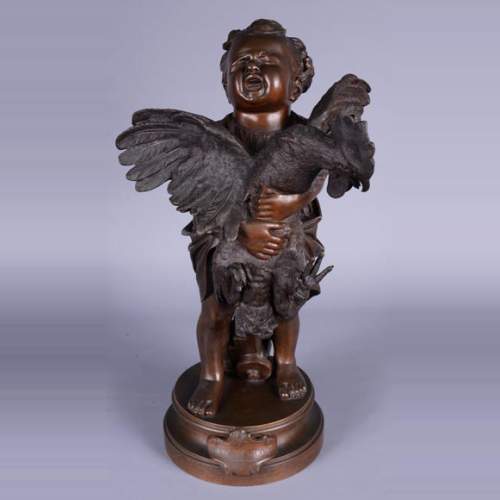Style Empire / Ref.03334
"Pauline Bonaparte as Venus Victrix" after CANOVA (1757 - 1822)
Dimensions
Width 43'' ¼ 110cm
Height 31'' ½ 80cm
Depth: 12'' ⅝ 32cm
Origin:
19th Century, Italy.
Status:
In its original condition, the base is broken in two and some cracks are empty. A finger was restored. A small loss at the end of a toe (restoration on demand).
The 'Venus Borghese» by Canova.
The Italian sculpture of the 19th century was made in Carrara marble. The Venus lays on a banquette in a Blue Turquin marble carved with a decor of Empire style. The backrest has a gondola shape that flowers and acanthus leaves adorn.
Artwork from the Grand Tour, the Venus is a reproduction of the model of Antonio Canova (1757-1822), a famous Italian sculptor, which is actually in the Villa Borghese in Rome. The original artwork was realized between 1804 and 1808 and represents the sister of Napoleon 1st, Pauline Borghese Bonaparte (1780-1825) when she was 24 years old. The commissioner of this sculpture was Camille Borghese, husband of the young lady since 1803.
The original sculpture had also been realized in this noble material that is the Carrara marble. This mineral rock gives the illusion of real carnation under the scissors of the sculptor. To breathe life into the cold marble block, Canova was the most gifted sculptor of his generation.
The beauty of this woman is enhanced by the apple she holds in her left hand. This detail seems insignificant but it actually refers to a passage of the Greek mythology. This fruit was supposed to show who between Aphrodite, Hera and Athena (or Venus, Juno and Athena in Roman mythology) was the most beautiful goddess. It is the mortal Pâris who had been chosen to judge of their beauty. He gave the fruit to Aphrodite, and soon it took the name of “Apple of discord”, because of the feeling of jealousy that it aroused in the other goddesses.
Recommended for you :
Dimensions:
Width: 25
Height: 43
Depth: 23
Dimensions:
Width: 30
Height: 36
Depth: 8
Dimensions:
Width: 56
Height: 52
Depth: 27
Dimensions:
Width: 47
Height: 23
Depth: 26
Dimensions:
Width: 38
Height: 68
Depth: 26
Dimensions:
Width: 41
Height: 74
Depth: 28
Dimensions:
Width: 70
Height: 156
Depth: 42
Dimensions:
Width: 53
Height: 63
Depth: 25
Dimensions:
Width: 15
Height: 14
Depth: 7
Dimensions:
Height: 78
Diameter: 68
Dimensions:
Width: 35
Height: 73
Depth: 8














